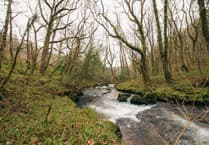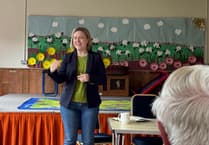District councillors were visibly frustrated with South West Water (SWW) representatives during a key meeting aimed at shedding light on the firm’s plans to end sewage spills.
Councillors at last week’s ‘scrutiny committee’ demanded to know when the company would “cease all polluting activities” following a recent report by the Environment Agency (AE) that found that SWW was the worst performing water company in the country for pollution incidents.
SWW also faced criticism over its handling of the cryptosporidium outbreak in May, when dozens of people fell ill and thousands of households were told to boil their tap water for almost two months.
SWW’s Helen Dobby admitted that the firm’s performance “is not acceptable” as she laid out the firm’s plans, saying it was aiming to reduce regional spills to 20 a year by 2025 and to 10 by 2040.
Councillors were left unimpressed, however. Cllr John McKay accused the firm of leaving the water network “in an appalling state” since privatisation more than 30 years ago.
“You've had 33 years to sort this out. This is not going to change because of the way you're constituted and the way you're funded,” he said.
Cllr Jacqi Hodgson accused SWW of kicking problems “into the long grass”, adding that a lack of long-term investment was partly to blame for the problem.
Tensions increased when she asked if SWW had made any changes to its policy on dividends (during the height of the cryptosporidium outbreak, SWW’s owner, Pennon Group, paid out £127 million to investors).
Stuart Madsen-Pilcher, for SWW, responded by saying the firm had “a long standing dividend policy” whereby investors “expect returns...as anyone would”.
A bemused Denise O’Callaghan then asked why CEO Susan Davy had not attended the meeting, saying it was important for councillors to hear what she had to say “on behalf of the residents who were so badly affected” by the cryptosporidium outbreak.
Questions were also raised about the cost of having tankers in the Kingsbridge Quay car park on stand-by to mitigate the impact of possible sewage spills, often as a result of activating storm overflows, which are meant to be used during heavy rain to prevent flooding.
However, SWW was recently accused of also causing dry spills in 14 areas along the River Dart over a two-year period by the Friends of the Dart Community group.
SWW’s response has been to launch campaigns to prevent ‘domestic sewage misuse’, urging the public to flush only human waste and toilet paper down the toilet.
After the meeting, Cllr Lee Bonham told this paper he was “very disappointed that South West Water did not answer our questions fully and openly”.
He said: “They missed a good opportunity to rebuild trust with residents across South Hams because their responses were evasive and incomplete. We asked them when and how they will reduce water pollution and improve water quality; sadly we got no answers. SWW pollution record is terrible, and I worry that they have no plan to improve things for our residents.”





Comments
This article has no comments yet. Be the first to leave a comment.